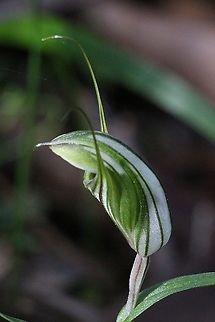
Appearance
''Pterostylis striata'' is a terrestrial, perennial, deciduous, herb with an underground tuber and when not flowering, a rosette of between five and nine dark green, wrinkled leaves, 4–15 mm long and 3–9 mm wide. Flowering plants have a single flower 16–19 mm long and 7–9 mm wide borne on a spike 40–250 mm high with three to five spreading stem leaves. The flowers are white with dark green stripes and a brownish tip. The dorsal sepal and petals are fused, forming a hood or "galea" over the column. The dorsal sepal curves forward with a thread-like tip 2–4 mm long. The lateral sepals are held closely against the galea and have erect, thread-like tips 14–20 mm long and a flat sinus with a small groove between their bases. The labellum is 7–9 mm long, about 3 mm wide, straight and just visible above the sinus. Flowering occurs from May to August.Naming
''Pterostylis striata'' was first formally described in 1877 by Robert FitzGerald from a specimen found near Yass. Fitzgerald published the description in his book ''Australian Orchids''. Plants in this species were formerly described as ''Pterostylis alata'' but that species is now recognised as a Tasmanian endemic. The State Herbarium of South Australia still lists ''Pterostylis alata'' as occurring in that state.Distribution
The mainland striped greenhood grows in a range of habitats from tea-tree scrub to forest and is widespread in Victoria. In New South Wales it is found south from Orange.Habitat
The mainland striped greenhood grows in a range of habitats from tea-tree scrub to forest and is widespread in Victoria. In New South Wales it is found south from Orange.References:
Some text fragments are auto parsed from Wikipedia.